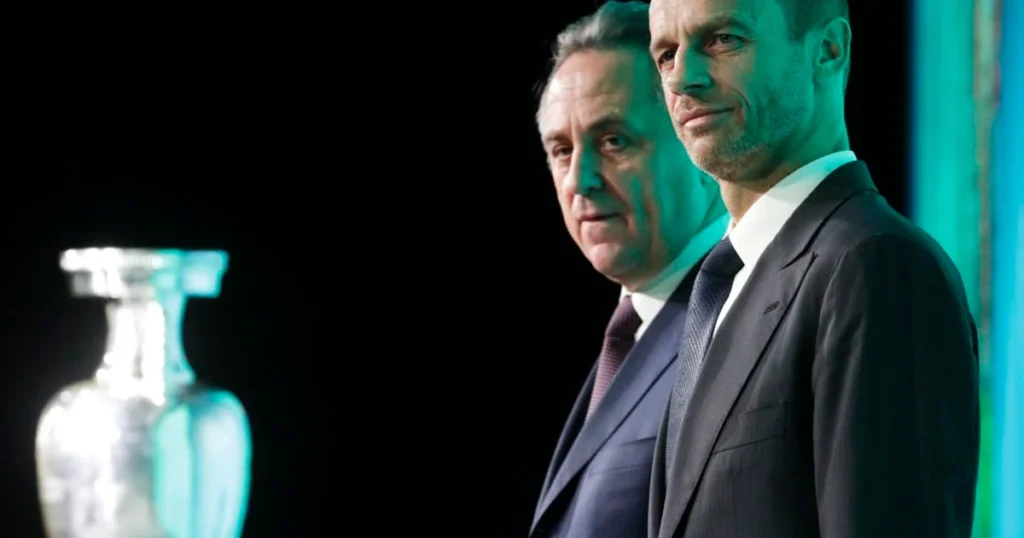
UEFA’s Approach to Russia and Rubiales Faces Scrutiny Regarding Values and Process
In recent months, UEFA, the governing body of European soccer, has found itself under the spotlight for its handling of two significant issues: Russia’s involvement in international football and the actions of Luis Rubiales, the president of the Royal Spanish Football Federation (RFEF). These developments have sparked intense debate within the soccer community and beyond, raising questions about UEFA’s commitment to its stated values and its decision-making processes.
Russia’s Troubled Path in International Football
The controversy surrounding Russia’s participation in international football competitions has been a matter of considerable concern for UEFA. Russia’s sportsmanship and adherence to fair play principles have come into question due to various incidents both on and off the field.
One of the most notable incidents occurred during the 2018 FIFA World Cup hosted by Russia. A group of Russian fans was involved in violent clashes with fans from other countries, raising concerns about security and fan behavior. These incidents led to sanctions imposed by FIFA, including fines and stadium bans for certain matches.
Additionally, Russia’s national team has faced accusations of doping, which has cast a shadow over its performances in international competitions. These allegations have raised doubts about the integrity of Russian football and its adherence to anti-doping regulations.
UEFA’s response to these issues has been a subject of scrutiny. Critics argue that the organization has not taken strong enough action to address the concerns surrounding Russia’s involvement in international football. Some have called for more severe sanctions, including the suspension of Russian teams from UEFA competitions.
Luis Rubiales and His Impact on Spanish Football
Luis Rubiales, the president of the RFEF, has been a polarizing figure in Spanish football. His tenure has been marked by a series of controversial decisions and actions that have drawn both praise and criticism.
One of the most significant incidents involving Rubiales was his decision to dismiss Julen Lopetegui as the head coach of the Spanish national team just days before the 2018 FIFA World Cup. Lopetegui had accepted an offer to become the head coach of Real Madrid, a move that Rubiales deemed unacceptable so close to a major tournament. The decision to fire Lopetegui garnered mixed reactions, with some applauding Rubiales for defending the national team’s interests and others criticizing him for destabilizing the squad.
Rubiales has also been involved in disputes with domestic clubs and leagues, including the Spanish La Liga. His handling of issues such as scheduling conflicts, broadcasting rights, and financial disputes has led to tensions within Spanish football. Some argue that his confrontational approach has hindered collaboration and unity within the sport.
UEFA’s Response and Accountability
The way in which UEFA has responded to these two high-profile issues has raised questions about its commitment to upholding its values and maintaining transparency in its decision-making processes.
Critics argue that UEFA has been hesitant to take strong action against Russia, possibly due to political considerations or the economic interests tied to the country’s participation in European club competitions. They assert that the organization should prioritize the principles of fair play and integrity above all else.
Regarding Luis Rubiales, UEFA has been urged to play a more active role in mediating disputes between national associations and club competitions. Some believe that UEFA should establish clearer guidelines for resolving conflicts and maintaining a harmonious relationship between domestic and international football.
The scrutiny of UEFA’s values and processes highlights the need for greater transparency and accountability within the organization. Soccer fans, players, and stakeholders around the world are closely watching how UEFA addresses these issues and whether it takes decisive steps to ensure that the principles of fairness, integrity, and respect for the game are upheld at all levels of European football.
As UEFA navigates these challenges, it faces the crucial task of balancing its role as a governing body with its responsibility to promote the values that underpin the sport of soccer. The world will be watching to see how UEFA addresses these complex issues and shapes the future of European football.





